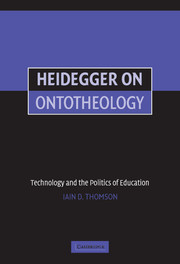Book contents
- Frontmatter
- Contents
- Acknowledgments
- A Note on the Notes
- Abbreviations Used for Works by Heidegger
- Introduction: Heidegger on Ontotheology
- 1 Ontotheology? Understanding Heidegger's Deconstruction of Metaphysics
- 2 Understanding Ontotheology as the Basis for Heidegger's Critique of Technology
- 3 Heidegger and the Politics of the University
- 4 Heidegger's Mature Vision of Ontological Education, or How We Become What We Are
- References
- Index
1 - Ontotheology? Understanding Heidegger's Deconstruction of Metaphysics
Published online by Cambridge University Press: 28 July 2009
- Frontmatter
- Contents
- Acknowledgments
- A Note on the Notes
- Abbreviations Used for Works by Heidegger
- Introduction: Heidegger on Ontotheology
- 1 Ontotheology? Understanding Heidegger's Deconstruction of Metaphysics
- 2 Understanding Ontotheology as the Basis for Heidegger's Critique of Technology
- 3 Heidegger and the Politics of the University
- 4 Heidegger's Mature Vision of Ontological Education, or How We Become What We Are
- References
- Index
Summary
INTRODUCTION: ONTOTHEOLOGY?
On hearing the expression “ontotheology,” many philosophers start looking for the door. Those who do not may know that it was under the title of this “distasteful neologism,” for which we have Kant to thank, that the later Heidegger elaborated his seemingly ruthless critique of Western metaphysics. The forcefulness of Heidegger's “deconstruction” (Destruktion) of the metaphysical tradition helped turn a generation of post-Heideggerian thinkers into antimetaphysicians, but Heidegger's deconstruction is actually premised on his attribution to metaphysics of an unparalleled pride of place in the historical construction and maintenance of intelligibility. Heidegger's deconstruction presupposes that metaphysics is not simply the esoteric concern of philosophers isolated in their ivory towers but that, on the contrary: “Metaphysics grounds an age” (QCT 115/GA5 75). To put the matter too quickly, but by way of anticipation, Heidegger's claim is that by giving shape to our historical understanding of “what is,” metaphysics determines the most basic presuppositions of what anything is, including ourselves. “Western humanity, in all its comportment toward entities, and even toward itself, is in every respect sustained and guided by metaphysics” (N4 205/NII 343).
By codifying and disseminating an understanding of what entities are, metaphysics provides each historical “epoch” of intelligibility with its ontological bedrock. And by furnishing an account of the ultimate source from which entities issue, metaphysics supplies intelligibility with a kind of foundational justification that (for reasons we will examine shortly) Heidegger characterizes as “theological.”
- Type
- Chapter
- Information
- Heidegger on OntotheologyTechnology and the Politics of Education, pp. 7 - 43Publisher: Cambridge University PressPrint publication year: 2005

